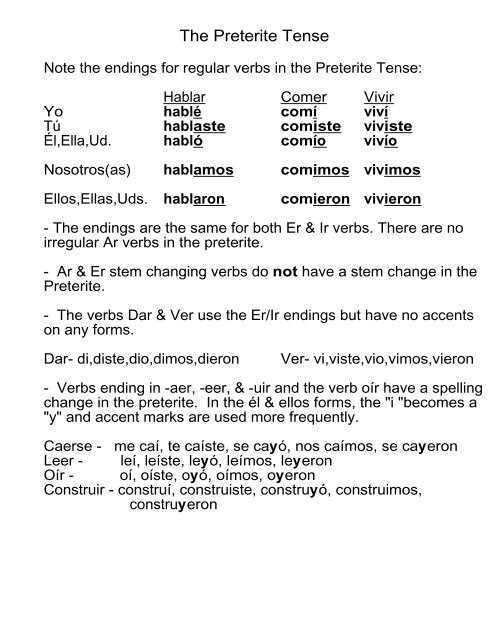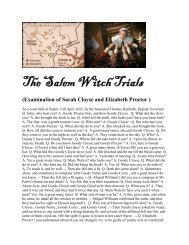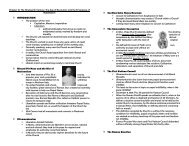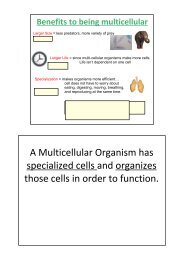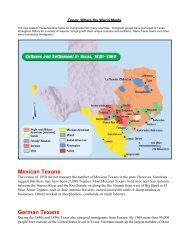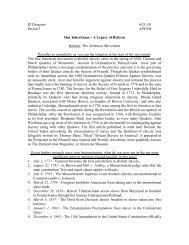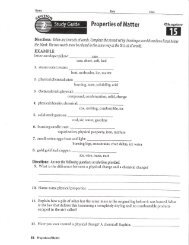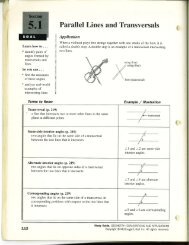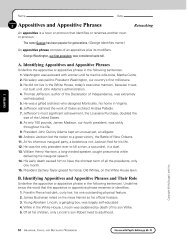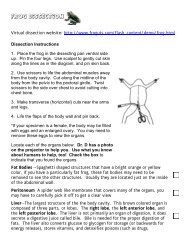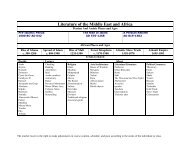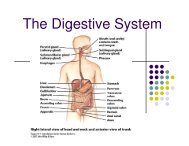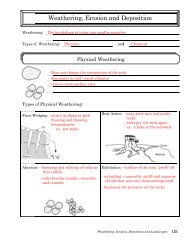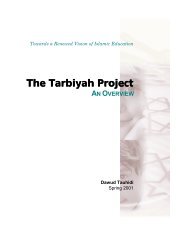You also want an ePaper? Increase the reach of your titles
YUMPU automatically turns print PDFs into web optimized ePapers that Google loves.
<strong>The</strong> <strong>Preterite</strong> <strong>Tense</strong><br />
Note the endings for regular verbs in the <strong>Preterite</strong> <strong>Tense</strong>:<br />
Hablar Comer Vivir<br />
Yo hablé comí viví<br />
Tú hablaste comiste viviste<br />
Él,Ella,Ud. habló comío vivío<br />
Nosotros(as) hablamos comimos vivimos<br />
Ellos,Ellas,Uds. hablaron comieron vivieron<br />
- <strong>The</strong> endings are the same for both Er & Ir verbs. <strong>The</strong>re are no<br />
irregular Ar verbs in the preterite.<br />
- Ar & Er stem changing verbs do not have a stem change in the<br />
<strong>Preterite</strong>.<br />
- <strong>The</strong> verbs Dar & Ver use the Er/Ir endings but have no accents<br />
on any forms.<br />
Dar- di,diste,dio,dimos,dieron Ver- vi,viste,vio,vimos,vieron<br />
- Verbs ending in -aer, -eer, & -uir and the verb oír have a spelling<br />
change in the preterite. In the él & ellos forms, the "i "becomes a<br />
"y" and accent marks are used more frequently.<br />
Caerse - me caí, te caíste, se cayó, nos caímos, se cayeron<br />
Leer - leí, leíste, leyó, leímos, leyeron<br />
Oír - oí, oíste, oyó, oímos, oyeron<br />
Construir - construí, construiste, construyó, construimos,<br />
construyeron
- Ir Verbs which have a stem change in the Present <strong>Tense</strong> also<br />
have a stem change in the <strong>Preterite</strong> <strong>Tense</strong>. This change only<br />
happens in the él and ellos forms.<br />
Pedir (e -> i) Juan pidió el coche a su papá.<br />
Ellos pidieron agua en el restaurante.<br />
Dormir (o -> u) Juan durmió bien anoche.<br />
Ellos no durmieron en su casa anoche.<br />
- Verbs ending in -car, -gar, & -zar have a spelling change in the<br />
yo form of the preterite<br />
-car (c->qu) Yo saqué muchas fotos ayer.<br />
I took a lot of photos yesterday.<br />
-gar (g->gu) No pagué mucho dinero por el libro.<br />
I didn't pay a lot of money for the book.<br />
-zar (z->c) Almorcé en un restaurante mexicano.<br />
I had lunch in a Mexican restaurant.<br />
- Note the forms of reír (to laugh) and sonreír (to smile):<br />
reír - reí, reíste, rió, reímos, rieron<br />
sonreir - sonreí, sonreíste, sonrió, sonreímos, sonrieron<br />
<strong>Preterite</strong> <strong>Tense</strong> - Ir & Ser<br />
(to be, to go)<br />
Note the <strong>Preterite</strong> <strong>Tense</strong> forms of Ir & Ser. <strong>The</strong>y are the same for<br />
both verbs.<br />
Ir Ser<br />
Yo fui fui<br />
Tú fuiste fuiste<br />
Él,Ella,Ud. fue fue<br />
Nosotros(as) fuimos fuimos<br />
Ellos,Ellas,Uds. fueron fueron
- <strong>The</strong> context of the sentence will usually tell which verb is being<br />
used.<br />
Fui al supermercado. I went to the supermarket.<br />
Juan fue un estudiante malo. Juan was a bad student.<br />
<strong>Preterite</strong> <strong>Tense</strong> - Irregular Forms - <strong>The</strong> "j" Group<br />
(To drive)<br />
Certain verbs are irregular in the <strong>Preterite</strong> <strong>Tense</strong> and have a "j" in<br />
the stem. <strong>The</strong>y are conjugated like "Conducir" below:<br />
Conducir<br />
Yo conduje<br />
Tú condujiste<br />
Él,Ella,Ud. condujo<br />
Nosotros(as) condujimos<br />
Ellos,Ellas,Uds. condujeron<br />
- <strong>The</strong> verbs Decir (to say), traer (to bring), and verbs<br />
ending in -ucir are conjugated like conducir in the <strong>Preterite</strong><br />
<strong>Tense</strong>.<br />
- <strong>The</strong>se verbs all have a preterite stem ending in -j. <strong>The</strong>refore<br />
this is called the "j" group.<br />
- <strong>The</strong>y all use the same endings<br />
-e, -iste, -o, -imos, -eron<br />
<strong>Preterite</strong> Stems<br />
decir dij- traer traj- traducir (to translate) tradujproducirproduj-
Other Irregular <strong>Preterite</strong>s - <strong>The</strong> "u" and "i" Groups<br />
Certain verbs have irregular <strong>Preterite</strong> <strong>Tense</strong> forms which have a<br />
"u" or an "i" in the stem. <strong>The</strong>y follow the conjugation of Estar<br />
below:<br />
Estar<br />
Yo Estuve<br />
Tú Estuviste<br />
Él,Ella,Ud. Estuvo<br />
Nosotros(as) Estuvimos<br />
Ellos,Ellas,Uds. Estuvieron<br />
- None of the forms require accent marks.<br />
Other Irregular Verbs Using <strong>The</strong>se Same <strong>Preterite</strong> Endings<br />
Infinitive <strong>Preterite</strong> Stem<br />
the "i" group<br />
hacer hic- ¿Qué hiciste ayer?<br />
(él form = hizo)<br />
querer quis- No quise ir a la escuela ayer.<br />
venir vin- Mario no vino a la fiesta.<br />
the "u" group<br />
andar anduv- Enrique anduvo rápidamente.<br />
estar estuv- Estuvimos enfermos ayer.<br />
poder pud- No pude hacer las tareas.<br />
poner pus- Armando se puso furioso.<br />
saber sup- Elena supo la verdad.<br />
tener tuv- No tuve dinero para ir al cine.
- Certain verbs change meaning when used in the<br />
<strong>Preterite</strong><strong>Tense</strong>:<br />
Present <strong>Preterite</strong><br />
conocer to know to meet for the first time<br />
querer to want to try<br />
no querer to not want to refuse<br />
saber to know to find out<br />
tener to have to receive (got)


